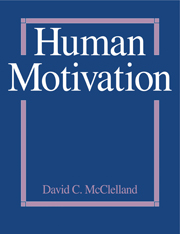Book contents
- Frontmatter
- Preface
- Foreword
- Contents
- Part 1 Background
- 1 Conscious and Unconscious Motives
- 2 Motives in the Personality Tradition
- 3 Motivation in the Behaviorist Tradition
- Part 2 The Nature of Human Motives
- Part 3 Important Motive Systems
- Part 4 Contextual Effects on Human Motives
- Bibliography
- Acknowledgments
- Index
2 - Motives in the Personality Tradition
Published online by Cambridge University Press: 05 July 2014
- Frontmatter
- Preface
- Foreword
- Contents
- Part 1 Background
- 1 Conscious and Unconscious Motives
- 2 Motives in the Personality Tradition
- 3 Motivation in the Behaviorist Tradition
- Part 2 The Nature of Human Motives
- Part 3 Important Motive Systems
- Part 4 Contextual Effects on Human Motives
- Bibliography
- Acknowledgments
- Index
Summary
Students of personality have been primarily interested in motivational dispositions in the individual. They have asked, What motives are there? How many are there? What are the most important motives? How do we know what motives a person has? This chapter's goal is to provide an overview of the answers to such questions that motivational theorists have given and, in particular, to consider how motives might be measured in people. Let us begin with the phenomena that have led theorists to assign motive dispositions to people.
• MOTIVES AS REASONS FOR WHAT PEOPLE SPEND THEIR TIME DOING
To a considerable extent there is a theory of motivation to go with every field of human endeavor. We observe that people do various things frequently and infer that therefore they must want to do them. People eat; therefore, they must want to eat. Some people do well in school, so we infer they have a need for academic success. Children play; therefore, they must have a need to play. Some people save; therefore, there must be a saving drive. People in business often work hard, and since business is organized around making a profit, economic theorists from the time of Karl Marx to the present have assumed they work because of the profit motive. In fact, a modern theorist like John Kenneth Galbraith (1967) has not hesitated to write a chapter in a book on economics entitled “The General Theory of Motivation” based on his observations of the various goals of economic enterprise.
- Type
- Chapter
- Information
- Human Motivation , pp. 31 - 67Publisher: Cambridge University PressPrint publication year: 1988



